Notis Mavroudis
Notis Mavroudis is one of our country's greatest artists.
He has had a constant presence in the country's cultural scene for many decades. His personal discography includes more than 50 albums as well as music for film and theater, arrangements for musical compositions, works for the classical guitar and songs performed by illustrious singers. He has given many recitals and concerts as a soloist, guitar teacher and composer, both in Greece and abroad.
He has produced an extensive collection of newspaper and magazine articles, collaborations with radio stations, and several books. His latest book, “Timely and timeless” (his sixth book so far), was published earlier this year. It is an excellent commentary on recurring issues that occupy the thoughts of all of us.
He has occasionally held important positions in state-owned institutions and organizations and has served as president of the Ministry of Culture's Arts and Letters Foundation and as artistic director at the Patras International Festival.
His work as a teacher began in 1969 at Milan's Municipal Academy of Music and has continued uninterrupted since 1975 in Greece.
His musical career is marked by many important distinctions. In 1990, his song "The pagliaccio" won the 1st award at Lisbon's international Children's Song competition. The same year, the Brazilian embassy in Greece presented him with the "Heitor Villa-Lobbos" award for his efforts towards popularizing the Brazilian composer's work in Greece.
His contribution to our country has been tremendous, he is one of those few composers who have managed to magically combine those two highest art forms, poetry and music, into a single corpus, the way only truly great artists can.
The launch of Radio Technis, the Greek section of Radio Art, presented an opportunity for a conversation with him, which he gladly accepted.
This very interesting conversation can be found below.
A dialogue with Notis Mavroudis
L.M: I would like to begin with a question which I think concerns everyone. How would you characterize our era? What would you improve in our world?
N.M: Certainly, I would desire an ideal society, with fewer problems, where the citizens’ financial issues have been resolved, where music, Poetry and the Arts are developing, where racism, the murder of women, domestic violence, wars and extreme exploitation will be completely absent… To these few I could add many more uncorrected evils!
However, let us admit that all these things we want (and wish for) are confined to the logic and philosophy of Utopia.
As for our era, I would characterize it as hysterical and corrosive.
Unfortunately, the undeniable achievements of science and technology do not go hand in hand with the extreme contrasts of worldwide political thought (or thoughtlessness).
What can I say? It may be that we are going through a transitional period, re-adapting to new ideas, since older ideas failed to find the ground and people needed to put a stop to the calamities that beset the masses living in neglect, debilitation and decay…
L.M: Of all important things in life, what is it that appeals to you the most, and why?
N.M: I am fascinated by the values of olden days, and the people who catalyzed the development of thoughts and ideas! In short, I am yet another nostalgic, a citizen of memory. I cherish those memories that I once found fertile and creative. I keep them all in my inner personal treasury, to which only I hold the key!
As the song goes: “no-one can take them from me.” I look to them for guidance and… protection from the shortcomings of modern aesthetics. Careful: I only keep what I deem useful and beneficial for the public good. And these occult “secrets” I combine with whatever happens to stand out in our day…
I adore old songs, some of those so-called “light songs”, Rembetiko, Hatzidakis, Theodorakis, Xarchakos, 60s’ composers, 80s’ rockers.
I am more skeptical concerning the recent evolution of popular songs and a few products of the Greek rock scene.
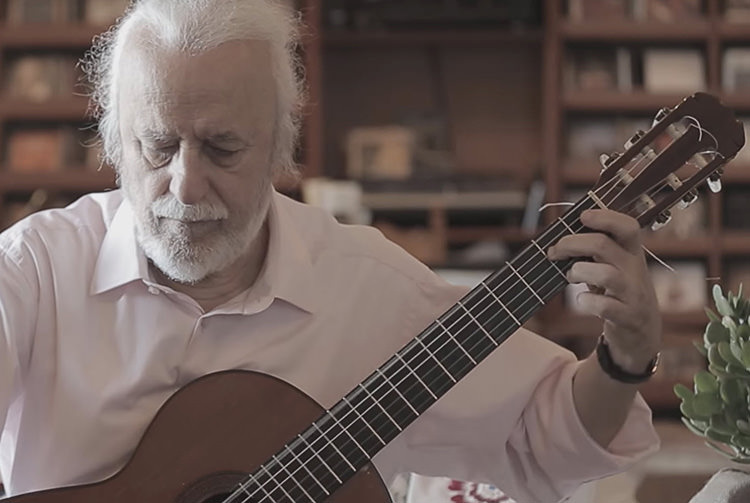
L.M: What was the greatest lesson you received in your life, and how did it help and empower you to go on?
N.M: It was not a single lesson. No single lesson can suffice, multiple experiences and events are needed, and you ought to observe them and… draw from them. After so many years of artistic activity, I have adopted a personal dogma. Unless you “take”, you cannot “give”. Every art needs communication, meaning a way to personally survey the horizons. Meaning to listen, see, feel, understand, borrow, even “steal” something so we can develop it in our own manner.
Since I began my recording career in 1964, I had a thorough experience of the Greek record industry and met notable creators and poets-songwriters-authors-actors, painters…
I was brought up in a world of creation. These were my most important “lessons”! Besides, how can I evaluate the true weight of my conversations with Hatzidakis, Mikis, Ritsos, Elytis,Lazanis, Dido Sotiriou, Titos Patrikios, Kampanellis, Nicola Piovani, Dario Fo, and countless singers, etc.
Believe me, I have accumulated great “riches” in my… treasury…
L.M: It is evident from your long career that you have worked hard to carve your own path. How important is carving our own way, in your opinion?
N.M: Careful: no path we can carve all by ourselves! And, what’s more, the path is not “my own”, as is (my) home, (my) car, (my) guitar. There are… invisible powers floating and mingling here, powers we cannot even fathom. We are not alone in this life. You get out of your home and listen, see, feel.
There is a certain detail: the unavoidable influences that permeate us, sound-images etc., that are blended within us and lead us to previously unthought-of paths. There are innumerable such elements (experiences-knowledge-information-ideas-questions, etc.) but they need our own choice, imagination and processing.
It is at this point where the creator becomes a “worker”. Commitment, persistence, imagination, and lots of hard work.
L.M: On this path, is it possible for one to discern expediency from truth, and choose to only follow truth, or is expediency capable of eroding people’s initially good intentions?
N.M: Those two are almost constant companions. After all, life offers opportunities, joy, sorrow, success, failure, expediency, truth and lies. You are the one who chooses what is important.
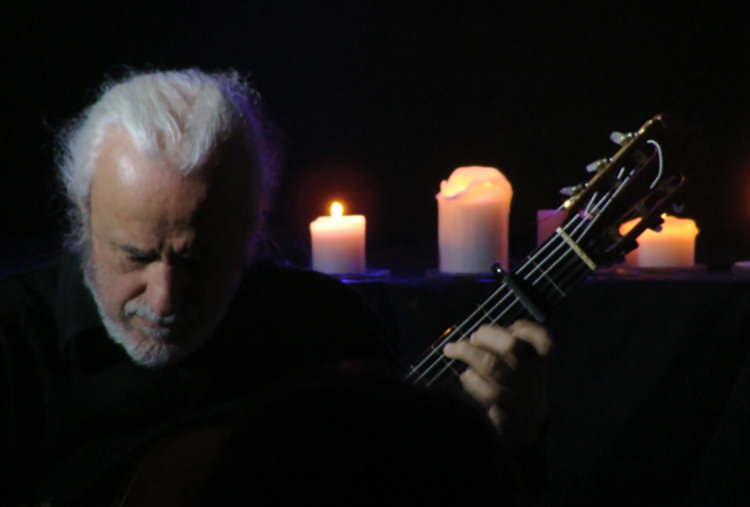
L.M: What is poetry, in your opinion?
N.M: Hmmm, I have to admit I cannot quite pinpoint and define Poetry. The same applies to Music. I imagine those two arts as immaterial. You can read them, listen to them, but you cannot quite grasp them… Poetry certainly has words, but words lose their prosaic meaning. They become lost in a celestial Universe and transform into highly personal concepts, and they decipher, after a manner, feelings, experiences, fantasies, they “play” with symbolism and allegory, in a way that may appear arbitrary to us, but is not so for the Poet. Poetry can never be direct, it is indirect. It is difficult to reveal its inner depth.
Someone once asked Kiki Dimoula for the definition of Poetry, and she had a hard time answering, eventually saying that Poetry is like a lonely tree in the vast Sahara desert; there, the poet has to conjure up some water to nourish this… tree! As a musician for 65 whole years, I’d say that music has the ability to touch the world of dreams! It imagines timbres, it is made to compose nonexistent, immaterial sounds, it feels like water running in a stream, seeking flow, meter, tempo, Harmony, the instruments one “hears” before composing, and aims to fill a gap, a silence! At the Odiums, they used to say Music is the Art of sounds! But we couldn’t dwell on such a rough-cut definition. We ought to give it further thought.
L.M: Do you think our era is less poetic than others?
N.M: There are poetic pursuits in every era; for as long as the contrasts and trials of humanity persist, poetic speech will be there to express them in its own way. As long as the human psyche wishes to “read” its expressive needs and articulate them using words, Poetry will be the desired medium. We live in the 21st century, and we get to “reap” both the goods and evils sown during the 20th. If we examine different eras, we’ll realize there never was a shortage of creators to portray depth and the human soul.
Finally, there is no such thing as a less or more Poetic era; it’s just that every era has different people, forms and interpretations.
L.M: Our main content here at Radio Technis is music and poetry, “an evergreen couple", how do you see this effort?
N.M: I must confess I cannot exactly picture an “Art radio” in the modern era, to maintain and safeguard art in the face of tough competition by this market of radio waves, advertisements, and ratings. This is quite hard even for state-funded channels. This “evergreen couple” you mention is currently in a defensive position, assailed as it is by a flood of songs, the better part of which will end up in the rubbish heap. And there are even more pleasantries lying “in store”...
This initiative of yours is truly heroic, and I congratulate you for it! I believe music and songwriting-poetic speech are meant to fuse together and become an intrinsic part of Art and Culture. Under normal circumstances, a true radio station should work this way. But can it???
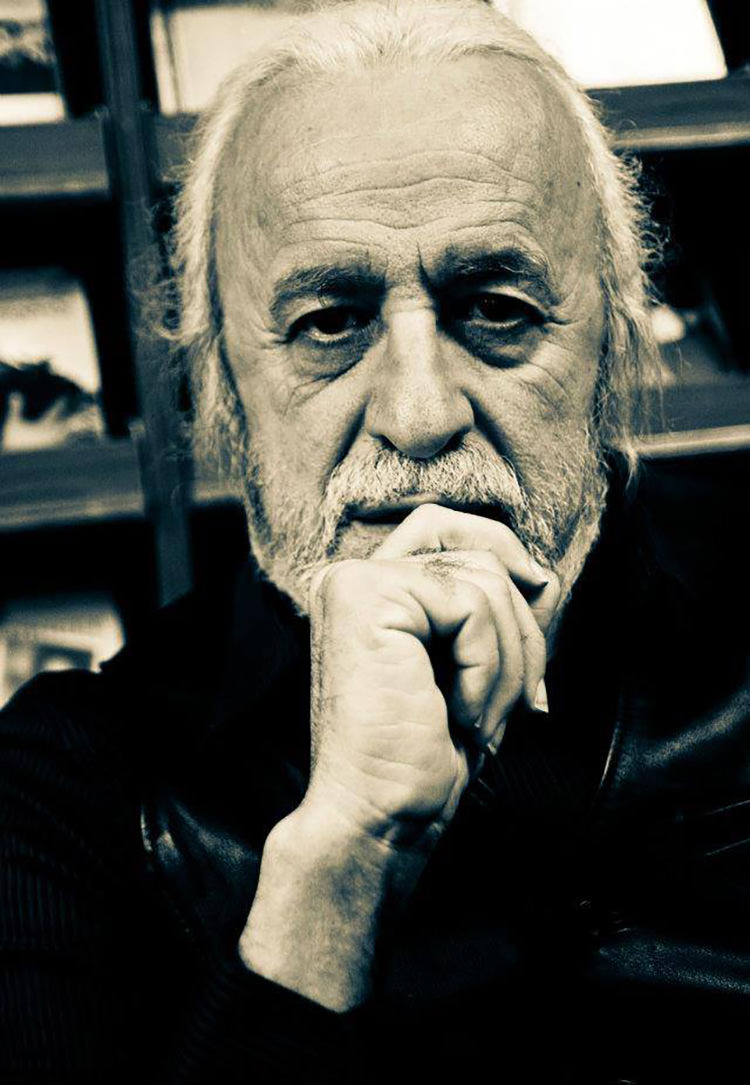
L.M: Are there any promising poetic voices today, a guarantee as to the continuation of our excellent poetic tradition?
N.M: Of course there are! Our age, as you well know, “offers” a wide range of themes. Poverty, wars, immigration, refugee waves, violence, dead-ends, more than the mind can take. I wouldn’t wish to mention anyone by name, for I’m liable to forget somebody. I could simply make recommendations, even for some youth groups showing remarkable poetic activity… All that is needed is care, support, and an understanding of the times and situations.
L.M: How would you respond to the following philosophical-reflective question: how could we lead an authentic existence and prove worthy of our unique presence in this world?
N.M: Your question is slightly perplexing to me, but, to prove “worthy of our unique presence in this world”, we ought to cherish what we, the human race, have achieved! Culture, the Arts, sensible traditions that are proving beneficial in our time, economic equilibria, while standing up to militarist “viewpoints” and ideologies leading to fascism and anti-democratic, backward practices. Only then will we be “worthy”...
L.M: Over the course of your life, you have met and worked with several enlightened people; without having to distinguish anyone, would you care to let us in on some of their thoughts that influenced you?
N.M: As I’ve said before, I have met and talked with many intellectual people, and I have “received” many useful things from them. I am grateful to them, because they provided a foundation for my own thoughts and views, especially during my youth. I believe that all those contacts shaped me, since even now, after 77 years, I still choose to follow the aesthetic ideas I developed in that intellectual environment.
They have proved very useful to me, in my longtime work both in classical guitar and Greek song, work which for me is a complex form of complete Art, not just a means of financial survival. For instance, my conversations with Hatzidakis have had a profound effect on my later career.
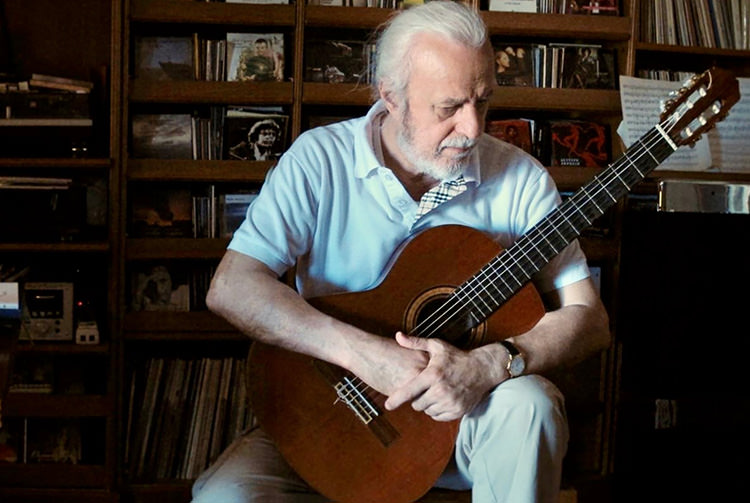
L.M: What is the meaning of life, in your opinion?
N.M: Good question! These few words pose the hardest question ever asked. Maybe the philosophers and futurologists could come up with an answer to that. It seems, however, that even they haven’t arrived at any definite conclusions, since the question keeps repeating itself and occupying everyone’s thoughts for 2,500 years now, and will never cease to trouble us!
I do wonder, though: how can the “meaning of life” possibly be a single thing? How can it be described in a single sentence? Or be answered according to one’s experiences, when each and every one of us is as unique as their own fingerprint? How can a well-fed German agree with a starving Asian/African/etc. on the “meaning of life”? I hold that the answer includes many meanings and many lifeforms. We would be liable to lose ourselves in a sea of those…
L.M: Would you say that silence consists of the voices and words of those absent, or the eloquence of those present?
N.M: Of course! I repeat, some of those “absent” ones were responsible for laying the foundations for a post-war culture with a huge impact on our country’s current culture. A foundation on which I myself have built, like many of my colleagues. I belong to the post-war generations which struggled for a better world, where we thought justice would prevail, along with the spirituality of art, traditions, culture, without inequalities and so many other wrongs. Instead of this, we realized that the… game is tough and murky. Times are still hard, and humanity is still suffering. We put our faith in people, dogmas, ideologies, struggles, systems, theories, visions, desires and so many more…
I feel we are going through a period when we ought to collect our broken pieces, refresh our thoughts and gather our strength; to give the younger generations the time and room they need, putting aside our various negative views on what we see as “the decadence of indifferent youth”, etc.
L.M: Are you optimistic about the coming future?
N.M: This is another tricky question. It rather depends on what one asks for. On what kind of future we envision, seek, desire. It demands we cooperate and communicate with one another. Is this possible? There are 8 billion of us on this Planet! So far, the future cannot contain optimism; we are living in an unbalanced age, with many loose ends waiting to be tied up. Our worn-out culture is heavily ailing, showing a hundred wounds caused by the gluttony of the people who rule the world, as it’s been shaped today. A violent world leaves no room for optimism…
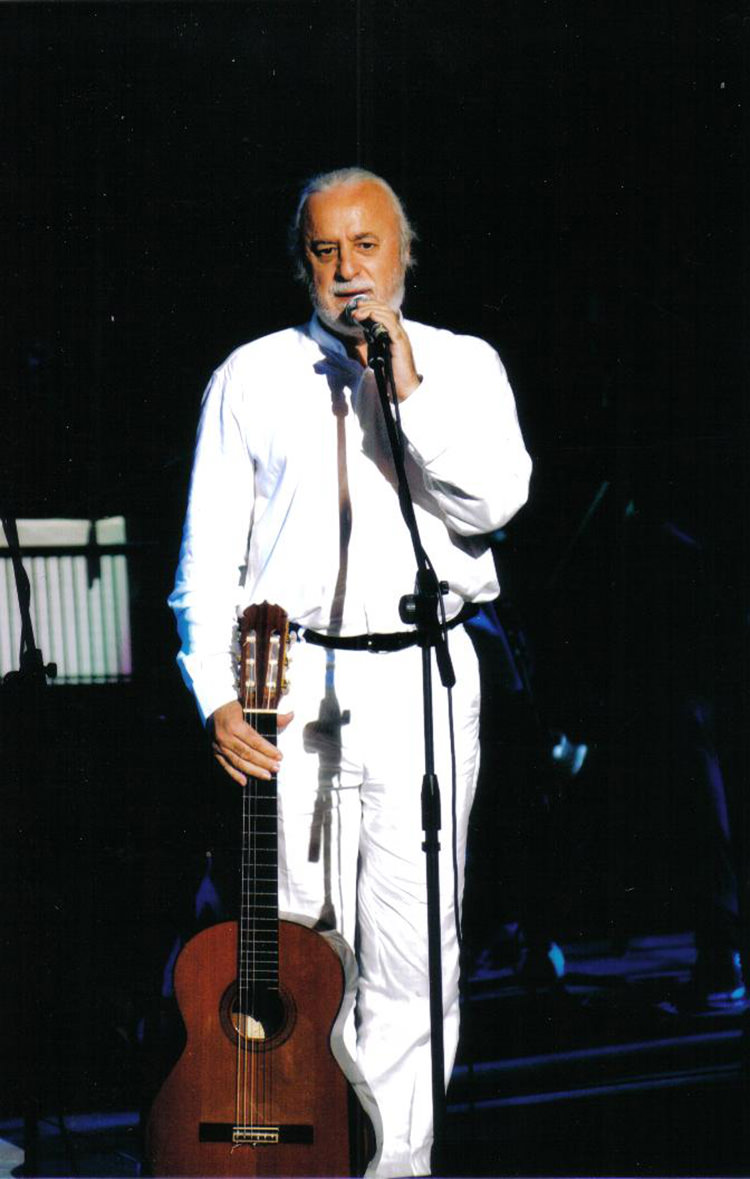
L.M: Do you have anything to say to young people just beginning their professional career?
N.M: Young people have no need of my advice. Young professional musicians are more qualified in terms of knowledge, information and absorption. They grew up in a world of organized education and can comprehend forms and content more clearly. They are also aided by the vast arsenal of technology, which offers enormous insight into the magical world of sound and color. What “advice” I can offer to young people is limited to an understanding of the market as it is today. Nothing is as it was before. This society is now populated by another kind of people, with different habits, in a world saturated with cheap music, meaningless content, a fast-food reality.
Today, a musician must work hard and seriously to enter the world of contemporary perceptions.
L.M: How would you describe your relationship with time today?
N.M: There’s a saying, “beware of time”. I have got my own version, which is “time is a serpent”... To get to the bottom of your question, one has to inevitably discuss death! Time has a beginning, and an end; it is a matter which is constantly troubling human intellect and every intellectual process and thought. My own relationship with time, for the moment, at 77 years of age, is proceeding smoothly and creatively enough, I’d say. The time I have left is less than the time I have left behind. My biggest hope now is that time does not manage to injure my dignity…
L.M: If someone made a film out of your life so far, what moments or points would you like the director to highlight and, most importantly, what soundtrack would you choose for it?
N.M: I would like the film to focus on the 60s. The period of my shaping, when I established my aesthetics and views. Studying guitar, the boites of Plaka, collaborations, friendships, love interests, political concerns, competition, records, concerts, contests… I have always held, however, that everyone is forced to reposition themselves in this liquid age, with its endless changes, view the aesthetic ideas that move us to creation under a new eye. Be a persistent revisioner of life’s rules, in a time when everything is constantly and incessantly changing!
As for the music I’d prefer as a soundtrack, I would definitely go with any work by Johann Sebastian Bach, naturally.
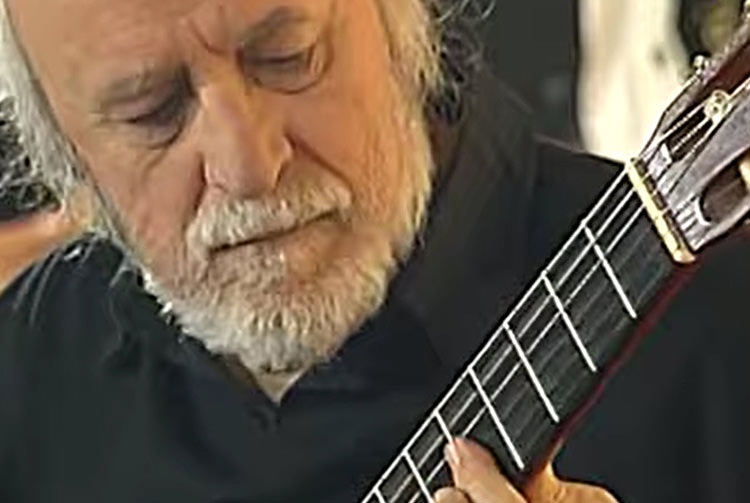
L.M: Is there a line of poetry that is like a “guide” in your life?
N.M: I will relate one of the songs I composed in the 70s, with lyrics by Alkis Christophelis:
“two steps back, one step forward
I take, and time is flowing onward…”
L.M: A few months ago you published a beautiful book titled “Timely and timeless”, in which you outline thoughts and ideas conceived at different points over the past few years. I would like you to tell us a few things about your book, and allow me to present, after our conversation’s end, your text “Choosing solitude”, a part of your book which I found deeply moving.
N.M: My book (it’s my sixth book so far) comprises comments and personal views on current issues that will never cease to concern the world. I usually begin with a piece of news I read or heard, before letting my thoughts expand in an effort to discern (investigate) its real depth and causes.
As you know, the times we live in are rife with issues, mostly unpleasant (war-the murder of women-inflating prices-violence-energy deficiencies-ecological disaster, etc.) What’s worse is that we are becoming used to living, growing, and surviving within this frustrating framework. I believe everyone in the world of arts and letters ought to focus their attention on these unfortunate developments of humanity, to make clear that what’s at stake is the ultimate decay of global civilization, which was established with much hardship and sacrifice.
In my book, “Timely and timeless” (Aparsis Publications), I examine events, looking for “opportunities” to leave my mark. That is, my own thoughts on the matter. The book is multi-themed by nature, its character is really close to my music’s aesthetic…
L.M: I would like to conclude our conversation by remind you that, many years ago, when I was still a highschool student I visited you uninvited, you received me with kindness and solved my guitaristic questions. Your magnanimity made me love music and art even more. And I deeply thank you for that.
N.M: What I did for you, others had often done for me. It was reciprocation, which is part of my character, thanks to my family tradition and Pontic roots…
L.M. Mr Mavroudis, we sincerely thank you for this wonderful conversation, and even more so for your ethos, which serves as a bright example for every single one of us, especially the younger generation.
N.M: The pleasure is mine, Mr. Mitropoulos
Selected from Notis Mavroudis’s latest book, “Timely and timeless”, published this year by Aparsis Publications, this beautiful text was written on December 27, 2019.
Choosing solitude
This old man sitting on a bench in the park near my place is totally unknown to me, even though I walk through there every day. He is always sitting at the very same spot, like one of Tsarouchis’s weary sailors, the only difference being that those were always young and handsome in a timeless sort of way… It’s as if his figure is made familiar by the many painters who, armed with pencils, brushes and paints, captured all these lonely, weary, gaunt old men of indeterminate age.
It really isn’t the first time I’ve encountered such a sight, yet there is a certain detail here I cannot fail to notice: my… own old man always carries a bottle of beer with him. Maybe it’s nothing particularly noteworthy, but for me it completes the picture by adding the element of alcohol. His gaze is vacant, who knows where he’s off to? To what mental or even real times and places? To what old joys, or the past misfortunes that brought him here in this hard place, sitting on this bench, alone and desolate, empty-eyed, silent, deserted maybe…
He is not a beggar, he never troubles anybody. I can perceive his inner solitude from his body posture, like a jacket draped over the back of a chair, from his battered, wrinkled face, from the desolace almost welling up in his watery eyes, and it all contrasts violently with the happy sounds of the families crossing the park, buying presents and enjoying their holidays. This creates in me the impression that this familiar stranger is experiencing his daily life through a veil of excruciating solitude… Maybe this bottle of beer is the… defining element to complete the image of loneliness.
I don’t know his name, or where he lives, or which neighbors he keeps in touch with, or indeed if he does keep in touch with anyone! I can’t help thinking that, in spite of his solitary appearance, he might have a family, he might be a man inordinately burdened by life, forced to shoulder more weight than a normal person could. I suppose his memories aren’t particularly pleasant, for his vacant stare, his weathered face, his silence, the beer, his total disregard for anyone else, for passers-by, seem to be his chosen “lifestyle”.
When I first passed him by, I greeted him, but I received no answer. It was the same again the next day, and the day after, until I finally quit greeting him.
At some point, I even considered striking a conversation with him, chatting about this and that, about the weather, or some football club. It’s an insignificant matter of course, trying to talk about… well, nothing. And yet I kept feeling that this man was sitting there to enjoy a much-needed solitude. My intervention might disorient him and even disrupt this need of his. In short, I felt like I was attempting to breach a fortress full of peaceful and tranquil inhabitants.
The familiar stranger has grown to the proportions of a true… riddle for me. I don’t know whether he is in need of any help, emotional or material. He has evolved into an inaccessible, mysterious presence. I’ve searched the few places frequented by the homeless here in Chalandri, or by those fed by the public or the church, but I have never met him. He has become a constant worry, a near-daily thought; and all this time that he’s missing from his spot, I am consumed by the fear that maybe something has happened to him, to this familiar strange mysterious man, that I would lose his image forever, this presence that keeps surfacing in my mind’s eye, since I’ve always had a profound fondness for old men and women, and for all the frail people in this World.
I have come to identify the familiar stranger with this emotional need of mine, and I must confess that his loss, whether actual or potential, would greatly disturb me.
Perhaps this is why my thoughts on the familiar strange old man tie in with the… celebratory need of these days, which remind us to care for the hapless and the frail…




